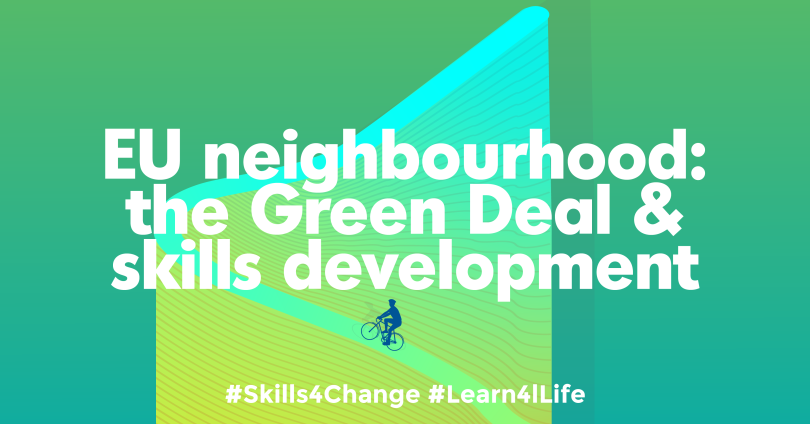
EU neighbourhood: the Green Deal and skills development
The European Green Deal, launched in December 2019, is an ambitious goal for the EU aiming for zero carbon emissions by 2050 and at the same time ensuring economic growth, respect for the earth’s resources, and the health and well-being of citizens. Although the EU accounts for just 10% of carbon emissions its efforts to address climate change reach beyond its borders. Climate change is a global challenge and the EU is a leader in development assistance and key protagonist in the global green transformation. The Green Deal is a key component of the EU’s external assistance with neighbouring regions.
EU budgetary framework and priorities
In the 2021-2027 budget, a new instrument will bring together diverse EU funds for external policies, the EU's COVID-19 recovery plan, and EU development policy within a new instrument, the Neighbourhood, Development and International Cooperation Instrument (NDICI) which has a budget of at €79.5 billion. Spending targets for this instrument include 25% on climate change, 20% on human development and 10% on migration, respectively
Moreover, the European External investment Plan (EIP) and the European Fund for Sustainable Development (EFSD) support international investment in initiatives that contribute to the UN's sustainable development goals (SDGs) and also address causes of migration and support green growth.
Green skills in ETF partner countries
The ETF’s work is devised and delivered in the context of the European Union’s policies and the EU's external relations priorities in support of the UN's Sustainable Development Goals. We are supporting partner countries to prepare for the green transition through the reform of human capital development systems that ensure a skilled and empowered workforce to enable the green transition. In addition, we are engaged with partner organisations in the development of the skills dimension in migration policy.
Within the European Education Area 2025, as part of the EU’s recovery plan, the Education for Climate Coalition is guided by five priorities: green skills development, teacher training, promoting behaviour change, linking education and science, and collective awareness raising. The ETF is actively engaged with key stakeholders in our partner countries advancing these priorities to ensure responsive education, training, and lifelong systems that can drive forward the green transition.
Good practice sharing
Good practice examples exist in the EU neighbouring regions and the ETF identifying and showcasing them to wider audiences at national, regional, European and international levels. The ETF has highlighted examples in the Ukraine, Serbia, Turkey and Georgia and will share others identifed through our recent Green call.
Individual initiatives need to join up at the wider system level for create impact on a larger scale. The green dimension must be integrated into all levels of society at national, regional, local and enterprise level and a multi-stakeholder approach will be key to its success including working with businesses and industries for collective solutions to climate change. The ETF is working with governments, social partners and civil society organisations to develop partnerships contributing to the green transition.
An international conference jointly held by the ETF and UNESCO 21-25 June 2021, will reflect on how systemic changes are facilitating lifelong learning, and how education and training systems might deal with green and digital futures while guaranteeing the right to education for all.
Did you like this article? If you would like to be notified when new content like this is published, subscribe to receive our email alerts.